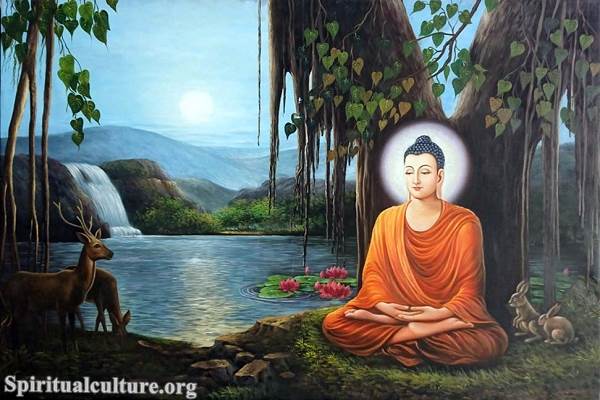However, it is essential to delve deeper into its meaning and implications to understand whether Buddhists genuinely believe in karma as many people perceive it.
In this article, Spiritual Culture will explore the intricacies of karma within the framework of Buddhism, its role in moral and ethical behavior, and its relation to suffering and personal responsibility.
Understanding Karma in Buddhism
The Concept of Karma
Karma, derived from the Sanskrit word “karman,” which means “action” or “deed,” refers to the law of moral causation. In Buddhism, karma is not merely a concept of fate or destiny; rather, it represents the intention behind actions and their subsequent consequences. Every action, whether physical, verbal, or mental, generates a karmic effect that influences future experiences and events.
Buddhism teaches that every sentient being is subjected to the law of karma. This means that individuals are responsible for their actions and the resultant consequences. Karmic actions can be categorized into three main areas: body (physical actions), speech (verbal actions), and mind (mental actions). Each of these domains operates under the principle that intentions influence outcomes.
Differences Between Karma and Fate
A common misconception is that karma is synonymous with fate. While karma involves the idea of cause and effect, fate often implies a predetermined outcome that is beyond an individual’s control. In contrast, Buddhists believe that while karmic actions influence future experiences, individuals have the power to change their current trajectory through conscious actions and intentions.
Karma emphasizes personal accountability and moral responsibility. For instance, if a person engages in negative actions, they might experience negative repercussions in the future, but they also have the opportunity to create positive karma through newfound behavior. This understanding shifts the focus from a deterministic worldview to one of active participation in shaping one’s life experience.
The Role of Intention in Karmic Actions
Volitional Actions in Buddhism
In Buddhism, the concept of “volition” (or “cetana”) is crucial to understanding how karma functions. Volitional actions are those driven by intention and mindfulness. It’s not merely the action itself that matters but the intention behind it. An act performed with good intentions creates positive karma, while an act with harmful intentions generates negative karma.
This principle is deeply woven into the ethical teachings of Buddhism. Practicing mindfulness helps individuals become aware of their intentions, promoting actions that lead to wholesome outcomes. As such, the cultivation of wholesome intentions is a central focus in many Buddhist practices.
The Impact of Thoughts and Speech
Thoughts also play a significant role in karmic outcomes. According to Buddhist teachings, every thought has the potential to create karma. This notion emphasizes the importance of mental discipline, as cultivating positive thoughts can lead to beneficial actions and consequences. It is said that “all actions are preceded by the mind,” highlighting the doctrinal belief that thoughts can lead to actions that ultimately shape one’s experiences.
Similarly, speech is another area profoundly affected by karma. Speaking with kindness, honesty, and compassion generates positive karmic effects, while harmful or deceitful speech has negative repercussions. This understanding encourages practitioners to engage in right speech—a critical component of the Noble Eightfold Path.
Karmic Consequences and Rebirth
How Karma Influences Rebirth
Buddhist cosmology teaches that after death, individuals undergo rebirth (or reincarnation), and karma significantly influences the nature of this rebirth. Various factors, such as the weight of accumulated karma, determine the realm into which one is reborn.
Karma operates on a continuum, affecting not only one’s current life but also future lives. For instance, engaging in moral and ethical conduct can lead to favorable rebirths in higher realms, while unwholesome actions can result in rebirth in lower realms, symbolizing suffering and hardship.
Transcending the Cycle of Rebirth
While karma influences rebirth, the ultimate goal in Buddhism is to transcend the cycle of samsara (the cycle of birth, death, and rebirth). This liberation is attained through achieving enlightenment (nirvana), a state where one is freed from all karmic binds. The cultivation of wisdom, ethical conduct, and mental discipline leads to the cessation of suffering and the end of the karmic cycle.
The path to enlightenment allows individuals to break free from karmic conditioning and take control of their future, thus emphasizing the core Buddhist belief that transformation is possible through mindfulness and ethical living.
Good and Bad Karma
Wholesome vs Unwholesome Actions
In Buddhist philosophy, karma is not simply categorized as good or bad but as wholesome (kusala) and unwholesome (akusala). Wholesome actions result from positive intentions and lead to positive outcomes, benefiting oneself and others. These actions embody qualities such as compassion, generosity, and wisdom.
Conversely, unwholesome actions stem from negative intentions, resulting in suffering and hardship. Actions driven by greed, hatred, and ignorance can lead to detrimental karmic consequences, reinforcing cycles of suffering.
The Cultivation of Positive Karma
Buddhists strive to cultivate positive karma through ethical practices, mindful living, and adherence to the Five Precepts, which include refraining from killing, stealing, sexual misconduct, false speech, and intoxication. By actively engaging in these practices, individuals enhance their volitional actions, paving the way for a more harmonious existence and positive karmic affluence.
Moreover, engaging in rituals such as merit-making, acts of compassion, and community service further adds to one’s positive karma. Such practices not only foster a sense of connection and empathy but also promote a deeper understanding of interconnectedness, a critical tenet in Buddhist thought.
Karma’s Relationship with Suffering
Understanding Suffering Through Karma
Suffering (dukkha) is a fundamental concept in Buddhism. Karma plays a crucial role in understanding the nature of suffering. The First Noble Truth states that life is permeated by suffering, but our actions and experiences are influenced by our karma. Unwholesome actions can lead to suffering, while wholesome actions can alleviate it.
By understanding the karmic origins of suffering, individuals are encouraged to cultivate positive actions and intentions, ultimately leading to a reduction in suffering. This transformative approach helps practitioners recognize that they are not victims of fate but active participants in their life journeys.
Karma and Personal Responsibility
Buddhism emphasizes personal responsibility concerning one’s actions and their consequences. Accepting responsibility for one’s karma is empowering; individuals can choose to alter their behaviors and intentions to generate more positive outcomes. This principle suggests that while external circumstances may influence one’s life, it is ultimately one’s actions that shape their experiences.
Being mindful of this relationship encourages practitioners to engage in self-reflection and ethical decision-making daily. It fosters a deeper connection with oneself and the broader community, as one recognizes the ripple effects of their actions.
Misconceptions About Karma
Karma as a Cosmic Justice System
One prevalent misconception about karma is that it operates as a cosmic justice system—a form of divine retribution for wrongdoings. This view simplifies and misrepresents the complexity of karmic processes. Karma does not function like a judicial system where punishments are meted out; instead, it embodies the natural law of cause and effect.
Buddhism teaches that karma is not predicated upon moral judgment from an external authority but arises from the inherent nature of actions and their consequences. This understanding allows for a more nuanced view of ethics, one that emphasizes growth and transformation rather than punishment.
Addressing Common Misunderstandings
Another common misunderstanding is the belief that karma is instantaneously dispensed—that good deeds will yield immediate rewards, and bad deeds will lead to swift punishment. In reality, the time lag between actions and their karmic consequences can vary significantly due to multiple factors, including the complexity of karmic relationships and the interplay of various circumstances.
Moreover, the consequences of actions can manifest in subtle ways, impacting mental states or future opportunities rather than overt situations. This transparency fosters an understanding of the interconnectedness of life and helps cultivate patience and resilience.
The Practical Applications of Karma
Mindfulness and Karmic Awareness
Practicing mindfulness is essential for understanding and navigating the complexities of karma. Mindfulness leads to greater awareness of one’s thoughts, intentions, and actions. It allows individuals to witness their mental states and behaviors non-judgmentally, enabling a clearer understanding of the karmic implications of their actions.
By cultivating a mindful approach, individuals can transform negative patterns into positive ones, consciously choosing wholesome actions and intentions that will shape their future experiences. This ongoing awareness supports personal development and nurtures a deeper connection with oneself and others.
Transforming Karmic Patterns Through Practice
Buddhism offers various practices, such as meditation and ethical living, to help individuals transform their karmic patterns. Engaging in meditation fosters inner peace, reduces suffering, and enhances awareness of one’s thoughts and actions. Additionally, the practice of compassion and loving-kindness can help break negative cycles, replacing them with more positive patterns.
Buddhists often undertake community service, engage in acts of kindness, and participate in rituals that inspire positive karma. These practices not only benefit the practitioner but also uplift the community, spreading goodwill and fostering harmony.
Conclusion
In summary, the question, “Do Buddhists believe in karma?” can be answered through a comprehensive understanding of the concept. Karma, in the Buddhist context, is less about fate or cosmic justice and more about personal responsibility and the moral consequences of actions. With an emphasis on intention and mindfulness, Buddhism encourages practitioners to actively engage in creating positive karma, cultivating ethical behavior, and understanding the intricate web of interconnectedness that shapes our experiences.
Through these insights, individuals can navigate their lives with greater awareness, compassion, and a sense of empowerment, ultimately leading to a reduction of suffering and a deeper understanding of existence. As they learn to transform their karmic patterns, they can unlock the potential for genuine happiness, well-being, and enlightenment, making the teachings of karma not just theoretical but practical and transformative.



